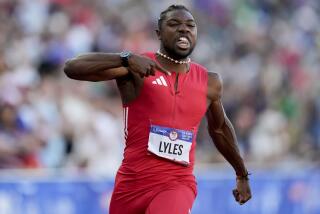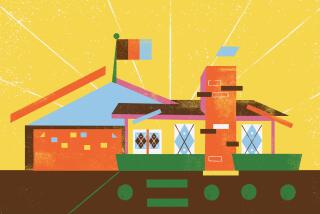Keflezighi Starts Endurance Race as an Eritrean, Ends It as an American
- Share via
SAN DIEGO — If you ever want to truly catch the American spirit, go watch a group of immigrants getting sworn in as citizens. It fills you with pride in a way that no amount of fireworks or John Philip Sousa marches could ever match.
You can see and hear the wheels of democracy in motion. It’s exhilarating, like watching hundreds of simultaneous births. People laugh and cry as they gain the rights most of us enjoy simply because we were born here. Some of them are willing to clean your house or take you to the airport at 5 a.m. just so they can have the chance to call themselves your fellow citizen.
The ranks of the voting population grew by 163 Thursday, when representatives of almost 30 countries pledged their commitment to the United States on a gray morning atop a seaside hill on Point Loma. Navy battleships cruised the waters below, with the skyscrapers of downtown San Diego barely visible through the overcast sky.
Larry A. Burns, the presiding judge, called out country after country and asked the representatives to stand as they heard their homelands. Canada and China. Egypt and El Salvador. Japan and Jordan. Laos and Mexico. Romania and Somalia. When Burns called Costa Rica, a woman stood up, waved the tiny American flag they each had received and cried out, “God bless America.”
When he finished, Burns asked if there was any country he had omitted. A slender man in a gray suit sitting in the front row stood and said: “Eritrea.”
His name was Mebrahtom Keflezighi, and his was quite a story. They all have stories, which is part of what makes these ceremonies so fascinating. The man sitting next to Keflezighi was 91 years old, had emigrated from Mexico and lived in America for 72 years before finally becoming a full-fledged member of its society.
The 23-year-old Keflezighi didn’t have to wait as long as the gentleman on his right, but he traveled a much greater distance. When Keflezighi named his country, it’s doubtful that many who heard him knew that Eritrea is located on the eastern side of Africa against the Red Sea. They probably had no knowledge of the war with neighboring Ethiopia that lasted more than 30 years, a battle that has flared anew recently after seven years of peace.
“Sometimes you take for granted what you have here,” Keflezighi said.
“I’ve seen soldiers surrounding the house. My brothers would have to hide. If you were that age [13 or 14] you could be taken.”
Keflezighi (it’s pronounced Kaf-LEZ-ghee, but he also goes by “Meb”) is the third-oldest of 11 children. His father, Russom, fled to Milan, Italy, for four years and brought the rest of the family with him for the final year. They moved to San Diego in 1987--”because America is the best country in the world,” Russom said--and he was granted political asylum. Russom, who was naturalized in 1996, made money as a cleaner at a bank and then a restaurant. He has driven a cab for the past two years.
Meb was 12 when he came here, so he basically has lived here for half his life. Finally, he is a part of the country he calls home.
“Now I’m a United States citizen,” he said. “I have to represent it the best I can.”
The oath the new citizens take is steeped in militaristic overtones, including a promise to “support and defend the Constitution and laws of the United States of America against all enemies, foreign and domestic.” Hopefully, the only combat Keflezighi ever will engage in will take place on a track, his weapons nothing more than his shoes and muscles.
Keflezighi is a distance runner, the best to come through UCLA. He won four NCAA individual championships last year and received the inaugural Carl Lewis Award as the nation’s outstanding collegiate male track and field athlete last month.
He dreams of wearing red, white and blue in the Olympics, and now that “The Star-Spangled Banner” is his national anthem, “The ultimate goal is to be on the stand and hear that.”
If there is one regret to his new citizenship, it’s that he will never represent Eritrea in international competition.
“It was a difficult decision,” Keflezighi said. “Eritrea’s never had anybody in a world championships or Olympics.”
He would have been the first. He lost that opportunity, but he gained peace of mind. It’s one less worry in a life that was hectic enough, judging by a week’s stretch in June.
Keflezighi, a communications studies major, studied for finals while in Dallas over a weekend for the Carl Lewis Award, came back and took a final on a Tuesday, then took another final on Wednesday and flew out that day to New Orleans, site of the U.S. Nationals competition. While in New Orleans he studied for his citizenship test, in which applicants are asked to show knowledge of American history and government (giving the names to things such as the three branches of government and the introduction to the Constitution, for example).
He will represent the United States in international competition for the first time in the Goodwill Games in New York later this month. That’s a change of pace from the sore spot that came up during the last Olympics, when many foreign athletes who attended U.S. colleges competed against the country that gave them education and training facilities.
Keflezighi has seen both sides, and doesn’t blame the athletes.
“They are recruited,” he points out, meaning the schools are looking to benefit too.
He turns it around. Why aren’t American athletes taking advantage of all this country’s resources? “The United States is the land of opportunities, and a lot of people aren’t using that,” Keflezighi said. “We need to expand our distance running and track and field. We have the best facilities and we can be the best.”
We, he said. As in we Americans. Some people, such as Keflezighi, will take a little extra pride in that pronoun on this Fourth of July.
More to Read
Sign up for Essential California
The most important California stories and recommendations in your inbox every morning.
You may occasionally receive promotional content from the Los Angeles Times.













